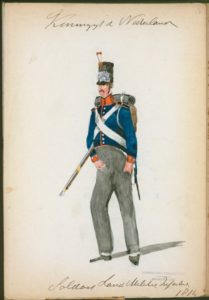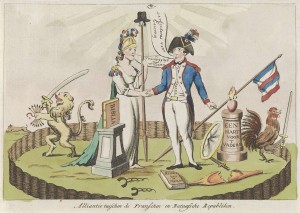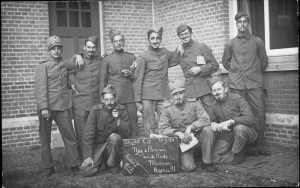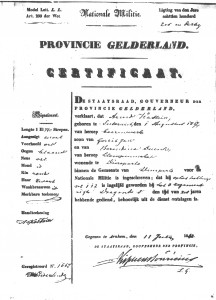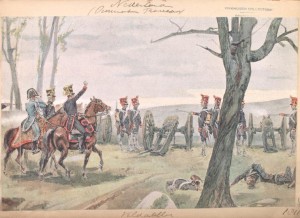De Hollandse Waterlinie (Holland Water Defense) was a uniquely Dutch defense system that combined large-scale inundations with strategically placed forts. In times of war, large sections would be inundated to prevent an approaching army from reaching the rich cities of the province of Holland. Some smaller scale inundations had been used in the Eighty Years War (1568-1648) but in 1672, when the Netherlands was at war on three fronts, the larger scale defense line that became known as the … [Read more...]
Dutch term – Soldaat
A soldaat is a soldier, the lowest rank in the army. Before the French occupation, the Netherlands only had a professional army. Soldiers were recruited from all over Europe, bringing many Scots, Swiss and other soldiers to the country. Conscription for men between the ages of 20 and 45 was introduced in 1810. It was suspended in 1997, though never officially abolished. … [Read more...]
Quick tip – Napoleonic army records available online
During the French occupation (1795-1813), many Dutch young men were conscripted into Napoleon's army. The French department of Defense has now made scans of the military records for this period online on the "Mémoire des hommes" [Memory of the men] website. The website contains military records of other French soldiers as well, including those who served in World War I, but these won't include many Dutch men. An indexing project is underway, but scans can already be browsed. Go to the … [Read more...]
Dutch term – Loteling
A loteling was a conscripted soldier, whose number came up. This 19th century term literally means "lottery person," which refers to the lot numbers that were assigned to all eligible young men. The ones with the lowers numbers had to serve. Until 1896, you were allowed to switch numbers, and the person who had to serve in another's place would be called a nummerwisselaar. … [Read more...]
Quick tip: Find out what your ancestor looked like
In the marriage supplements, the documents that a bride and groom had to submit when they got married, you will usually encounter a certificate stating that the groom had fulfilled his military duties. About half the time, this form will include a physical description. See elsewhere on this site for a list of terms with their translations. The example below is the certificate for Arend Kastein, showing that he was 1.74 m (5'9") tall, an oval face, ordinary stern, blue eyes, an ordinary nose and … [Read more...]
Dutch term: nummerwisselaar
A nummerwisselaar or number changer was a person that was hired as a replacement for military service. Often, this was somebody who signed up in the same year, but whose number did not come up. They literally "exchanged numbers" so one man served instead of the other. In most cases, a contract between the (father of the) draftee and his substitute was drawn up before a public notary. It stipulated the terms, often involving a sum of money to be paid immediately and another sum after the … [Read more...]

